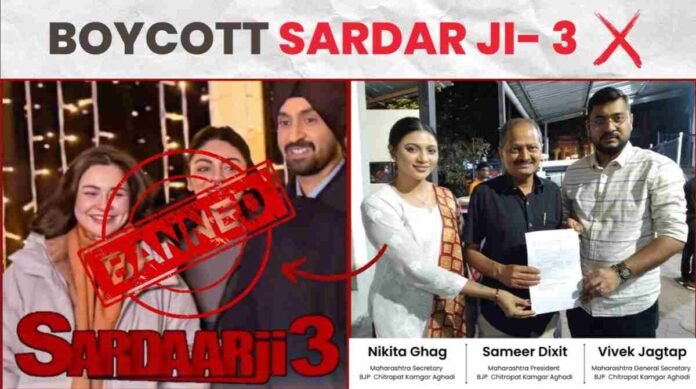In a significant cultural clash underscored by ongoing geopolitical tensions, the BJP Chitrapat Kamgar Aghaadi has vocally opposed the inclusion of Pakistani artistes in the much-anticipated film ‘Sardar Ji 3,’ featuring popular Indian actor Diljit Dosanjh. Slated for release on June 27, 2025, the film’s cast includes Pakistani talents Hania Aamir, Nasir Chinyoti, Daniel Khawar, and Saleem Albela, igniting a firestorm of controversy that raises pivotal questions about nationalism and artistic expression within the Indian film industry.
The BJP Chitrapat Kamgar Aghaadi, a union representing countless workers in the Indian film sector, has formally petitioned the Central Board of Film Certification (CBFC) to withhold a censor certificate for ‘Sardar Ji 3.’ The union’s objections are deeply rooted in the current political climate, exacerbated by recent incidents and animated criticisms from Pakistani entertainers towards India. Sameer Dixit, State President of the BJP Chitrapat Kamgar Union, articulated the sentiment: “In light of our current political climate, it is essential that our film industry mirrors the feelings of our citizens. We cannot in good conscience embrace collaborations with artists from a country that exhibits open hostility towards India.”
Supporting this stance, State General Secretary Vivek Rajendra Jagtap emphasized that the contentious remarks made by Pakistani artistes regarding Indian operations have strained relations further, necessitating a reassessment of such collaborations. “Our request is straightforward: any film featuring Pakistani artists should undergo intense scrutiny and, if deemed necessary, be halted. Our national integrity must be prioritized over commercial interests,” he stated.
Despite the fervent protests from the union, the film industry remains divided. Many producers and directors advocate for art’s transcendence over political boundaries, arguing that creativity should promote unity rather than division. BJP Secretary Nikita Ghag voiced this perspective, suggesting that the denial of platforms based solely on nationality threatens the integrity of artistic expression. “Art is a medium that brings people together, regardless of nationality. Halting artists based on their origins is a slippery slope that could jeopardize the core of creativity and collaboration,” she remarked.
The controversy surrounding ‘Sardar Ji 3’ also rekindles a broader discourse about the impact of geopolitical tensions on cultural collaborations. At the heart of this discussion lies a critical question: Should art be political, and to what extent should national sentiment shape artistic expression? While some argue that collaboration fosters understanding, others contend that national integrity must take precedence.
As anticipation builds for the CBFC’s decision regarding ‘Sardar Ji 3,’ the outcome of this dispute could establish a precedent for future collaborations between Indian and Pakistani entertainers. Industry insiders suggest that the film’s fate could have far-reaching implications, not only for the project itself but for the larger framework of cross-border artistic engagements.
In conclusion, the debate surrounding ‘Sardar Ji 3’ sharply encapsulates the fraught intersection of art, nationalism, and geopolitics. While the BJP Chitrapat Kamgar Aghaadi’s demands echo a significant portion of public sentiment, they simultaneously raise complex questions about identity and the role of cultural industries during tumultuous times. As the film’s release date approaches, industry stakeholders and audiences alike await the CBFC’s ruling, aware that the resolution of this controversy could reshape the landscape of artistic collaboration in the Indian film industry for years to come.


